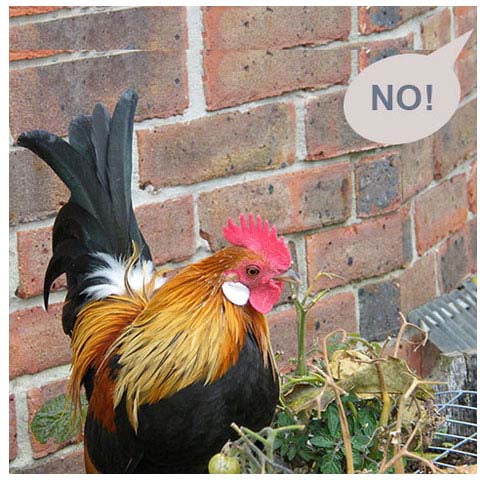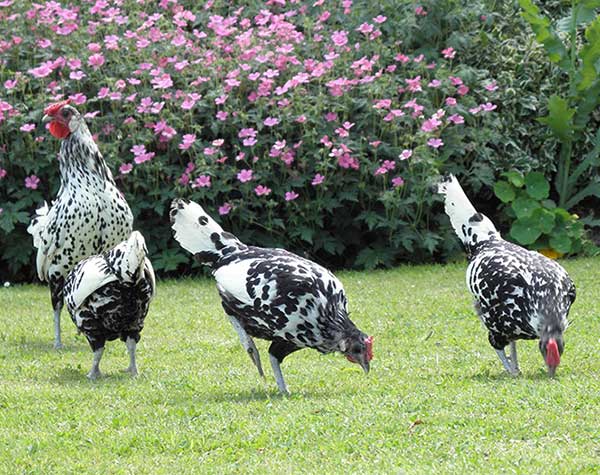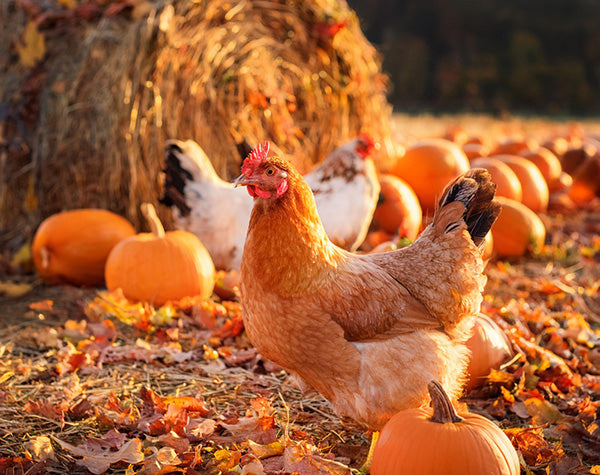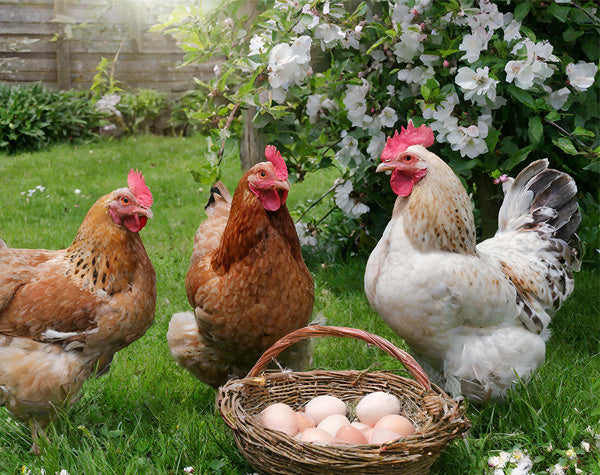What You Shouldn't Feed to Your Chickens
When it comes to keeping chickens, their diet is one of the most important aspects of their care. Feeding your chickens the wrong foods can lead to a range of health issues, some of which can be fatal.
To help you ensure your chickens stay healthy and happy, here’s a guide to the top 5 foods and plants that should never be given to chickens:
Top 5 Plants and Foods You Should NEVER Feed to Chickens:

1. Rhubarb & Leaves: Rhubarb contains oxalic acid, which can cause severe liver damage and is potentially deadly for chickens.
2. Chocolate: Much like dogs, chickens cannot tolerate chocolate. It can cause vomiting, diarrhoea, and can be lethal if ingested in large amounts.
3. Uncooked Beans: Raw beans contain hemagglutinin, a compound that can cause blood clots and is extremely toxic to chickens, often resulting in death.
4. Raw Potatoes (and other plants from the nightshade family): Raw potatoes contain solanine, which can cause heart failure in chickens. This applies to any plant in the nightshade family, such as tomatoes and aubergine (eggplant).
5. Mouldy Food: Never feed your chickens mouldy food. Mould can cause digestive issues, lead to diseases like botulism, and may contain harmful bacteria that are dangerous for chickens.
For a list of foods and plants to avoid feeding your chickens, click this link Foods & Plants you shouldn't Feed to Chickens or click on the image above to open it.

Aside from these top five toxic foods, there are many other items to be cautious about, especially processed foods. In our list above, we categorised them based on their level of danger:
• Toxic: Foods and plants that are poisonous and can cause serious health issues or death (e.g., Raw Beans, Chocolate, Rhubarb).
• Foods to Avoid: Foods that are not immediately deadly but can lead to other health problems (e.g., Cheese, any processed meats).
It should be noted that, under APHA rules, it is illegal to feed kitchen waste and leftovers to your chickens if consuming the eggs*.
Some of the items on our list might surprise you. Did you know that foods like raw beans, cheese, bread, cat food, and even long grass clippings can be harmful to your chickens?
Notes on Foods to Avoid or Limit
I will readily admit that when it comes to doughnuts, I’ve been accused of – somewhat harshly I feel - having a ‘gluttonous’ appetite and my ability to devour three pieces of birthday cake has even been called ‘impressively piggy’. But, just as indulging in too many sweet treats isn’t good for my health, there are certain foods and plants you should avoid giving to your chickens to keep them healthy and happy.
In addition to the colourful list above I will add some other ‘beware’ items, and then go on to advise, from long experience, what you should feed your chickens for optimum health. Visit our Poultry Feeds page for a selection.
1. Raw Peanuts
While raw peanuts are a beloved snack for wild birds, providing them with energy in winter, they are unsuitable for chickens. Raw peanuts contain enzymes like lectin and trypsin, both of which can be harmful, and if nuts are mouldy, they produce aflatoxins that can cause liver damage. We advise that it’s safest to avoid raw peanuts entirely.

Although cooked or roasted peanuts may be safer (as cooking largely destroys trypsin), they are still high in fats and oils, which can inhibit a balanced diet.
Additionally, avoid processed commercial peanuts (human snacks), as they often contain high levels of salt, always a no-no as it can cause kidney damage in poultry. If you do wish to offer peanuts, stick to plain, roasted, unsalted varieties - sparingly - if you can find them.
Despite being marketed in some places as a treat for poultry due to their protein content, peanuts can still be harmful in large quantities. While protein is essential for chickens, like us, too much can lead to weight gain and health issues.
Please do note the difference in peanut advice, due to availability, between the UK and the US when considering the apparently conflicting information out there. In the UK, peanuts are generally imported - mainly from India, the US and Türkiye - and processed for wild birds, peanut butter, or snacks, whereas in the US, peanuts (groundnuts) are primarily home-grown and sold differently.
2. Rotten Vegetables

Feeding your chickens fresh vegetables occasionally is great, but make sure they are not spoiled or rotting. Rotten vegetables can cause serious problems, including botulism, which often manifests as a floppy neck or paralysis in chickens. Just as you wouldn’t eat rotten food, your chickens shouldn’t either.
If you want to offer your hens vegetable treats, consider well-boiled potato peelings (but never raw or green potatoes), carrots, or a few leaves of cabbage or other greens. Remember to keep these treats in moderation and not necessarily offered every day.
3. Sunflower Seeds and Sweetcorn
Although your chickens might eagerly gobble up sunflower seeds and sweetcorn, these treats should also be given sparingly. Sunflower Seeds are high in fat, good for energy in colder months, and contain Vitamin E - Sweetcorn, lots of carbohydrates but is high in starch and sugar - too much can upset the digestion leading to runny yellow droppings. Rule of thumb, once or twice a week.
4. Toxic Plants
If your hens are lucky enough to free range in your garden, be aware of the plants they might encounter. Certain plants are toxic to chickens and should be avoided at all costs. These include Laburnum, plants from the Pea family, Potato and Tomato foliage (a big NO to our cockerel here in amongst the tomato plants), Privet, Yew, Rapeseed, and Foxgloves.

While there are foods to avoid, there are plenty of healthy treats you can offer your chickens that are designed to be both entertaining and nutritious, helping to keep chickens occupied.
Ultimately, just like us choosing between a plate of doughnuts and a healthier bowl of fruit, providing your chickens with a balanced diet is crucial. Spoiling our feathered friends is part of the joy of keeping chickens, but ensuring their diet is right will help them thrive for years to come.
What You Should Feed Your Chickens for Their Health

To keep your chickens in good health, lay nice eggs, and enjoy life, the right diet is essential.
Remember, they are ancestrally jungle fowl, but although their instinct to scratch about in leaf litter is still there, we have domesticated them over thousands of years, so we now need to provide them with a good diet.
While the bucolic image of chickens freely scratching around a farmyard for bugs, slugs, and bits of corn might evoke fond memories, the reality of chicken keeping today often involves more protection and management.
Many of us house our chickens in enclosed runs to protect them from predators and the elements. Because of this, it's essential to provide a well-rounded diet to keep them healthy, happy, and laying eggs consistently.
The Foundation of a Chicken's Diet is Layers Pellets
A chicken's primary diet should consist of Poultry Layers Pellets, which are specially formulated to meet all the nutritional needs of adult chickens.

These pellets should be available at all times (ad-lib) in a Poultry Feeder, ensuring your hens can eat whenever they’re hungry.
Layers Pellets provide the right balance of carbohydrates, protein, vitamins, and minerals, essential for keeping your chickens in good condition throughout their life.
Supplementing with Poultry Corn
In addition to Layers Pellets, a daily handful of Poultry Corn scattered on the ground encourages natural foraging behaviour, which can keep your chickens entertained and active. However, it's important that chickens eat their primary feed before indulging in any treats or extras to ensure they receive all necessary nutrients.
All-Round Feeds
For those who prefer an all-in-one option, there are comprehensive feeds like Alfamix for Chickens, which combine various ingredients to cover all your chickens’ dietary needs. These feeds are packed with a variety of goodies, offering well-rounded nutrition that helps maintain your chicken’s health and vitality.
Treats and Enrichment

While it's tempting to spoil your chickens with treats, it's crucial to do so in moderation.
Many treats are specially formulated for poultry, providing not only nutritional benefits but also enriching their environment, especially if your chickens are confined to a run. These treats can keep chickens stimulated and entertained, preventing boredom and encouraging natural behaviours. To explore a variety of healthy treat options, you might visit our Chicken Treats page.
Moderation is Key
Remember, the key to a chicken’s diet is balance. Treats and additional foods should never replace their staple diet of Layers Pellets and Poultry Corn. Too many treats, vegetables, or extras can lead to an unbalanced diet, which might cause health issues, weight gain, or reduce egg production. Always ensure your chickens are primarily consuming their staple feed before offering additional treats.
By maintaining a balanced diet and providing a stimulating environment, you'll keep your chickens healthy, content, and productive, ensuring they lead a long and happy life.
If your girls are looking a little worse for wear our Chicken Checkup Info Page is always worth a look to aid in a diagnosis. Or visit our blog for our 12 Dos and Don'ts of Chicken Keeping.
Further Reading
How Does a Chicken Make and Egg
Flyte so Fancy's Guide to Chicken Keeping
Our Chicken Information Centre
*A Note on Rules Regarding Feeding Pet Chickens:
I think it is right to mention here that the APHA (the UK governing body) - have regulations about giving food to poultry from kitchen waste/scraps, or obtaining kitchen waste from catering establishments, to use as food for poultry.
The rules are that there is potential for contamination by animal or dairy by-products (ABPs), so if they are farmed for human consumption, it is illegal to feed such foods to pets where they or their products e.g. eggs, are used for human consumption.
The important thing here is - kitchen scraps or waste. This does not include purchasing a cabbage for your birds and putting it in their pen as it is not kitchen 'waste'. It does mean that, legally, even for your pet chickens, you cannot make a stew or curry and feed the left-overs to your birds.
- - -
What should I avoid Feeding to Chickens ©Flyte so Fancy 2015. Updated 2024. Authors: James Bezant and Anne Weymouth. Reproduction of part or all of this text is only possible with the express permission of Flyte so Fancy Ltd.



